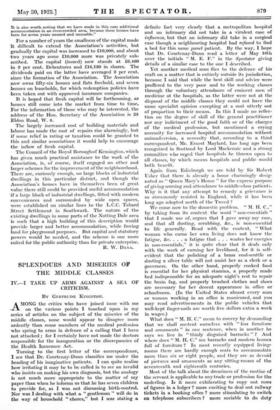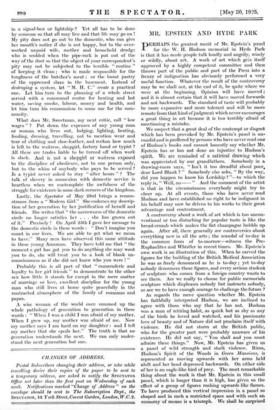SPLENDOURS AND MISERIES OF THE MIDDLE CLASSES
IV.—I TAKE UP ARMS AGAINST A SEA OF CRITICISM.
BY GERTRUDE KINGSTON.
AMONG the critics who have joined issue with me on the various points I touched upon in my series of articles on the subject of the miseries of the middle classes, none would appear to disagree more ardently than some members of the medical profession who spring to arms in defence of a calling that I have not attacked ; for I certainly have not made the doctors responsible for the inauguration or the discrepancies of the Health Insurance Act.
Turning to the first letter of the correspondence, I see that Dr. Courtenay-Dunn classifies me under the heading of bis imaginative patients. I can quite realize how irritating it may be to be called in to see an invalid who insists on making his own diagnosis, but the analogy is not much more appropriate to the matter of my paper than when he informs us that he has seven children to provide for, as I was . not discussing birth-control. Nor was I dealing with what a " gentleman " will do in the way of household " chores," but I was stating a definite fact very clearly that a metropolitan hospital and an infirmary did not take in a virulent case of influenza, but that an infirmary did take in a surgical case though a neighbouring hospital had refused to find a bed for this same panel patient. By the way, I hope that Dr. Courtenay-Dunn read a letter of May 16th over the initials " M. E. F." in the Spectator giving details of a similar case to the one I described.
Yet another medical man flies to the defence of his craft on a matter that is entirely outside its jurisdiction, because I said that while the best skill and advice were proffered to the very poor and to the working classes through the voluntary attendance of eminent men of medicine at the hospitals, as the latter were not at the disposal of the middle classes they could not have the same specialist opinion excepting at a cost utterly out of proportion to their means. In this I made no reflec- tion on the degree of skill of the general practitioner nor any indictment of the good faith or of the charges of the medical profession, but mentioned a crying necessity for increased hospital accommodation without animadversion, a necessity that, according to a third correspondent, Mr. Ernest Maylard, has long ago been recognized in Scotland by Lord Mackenzie and a strong committee who urged that hospitals be thrown open to all classes, by which means hospitals and public would both benefit.
Again from Edinburgh we are told by Sir Robert Usher that there is already a home charmingly desig- nated as " Queen Mary's House " for the express purpose of giving nursing and attendance to middle-class patients. Why is it that any attempt to remedy a grievance is so strenuously resisted in England, while it has been long ago adopted north of the Tweed ? We come now to the domestic problem. " M. H. C.," by taking from its context the word " non-essentials " that I made use of, argues that I gave away my case, and that all dusting, scrubbing, &e., is non-essential to life generally. Read with the context, " What woman who earns her own living does not know the fatigue, &c. . . . a fatigue that . . . wastes her energies in non-essentials," it is quite clear that it deals only with the work of earning her livelihood, for it is self- evident that the polishing of a brass coal-scuttle or dusting a silver table will not assist her as a clerk or a governess. On the other hand, properly cooked food is essential for her physical stamina, a properly made bed indispensable for an adequate night's rest to repair the brain fag, and properly brushed clothes and shoes are necessary for her decent appearance in office or schoolroom. (In the United States almost every man or woman working in an office is manicured, and you may read advertisements in the public vehicles that well-kept finger-nails are worth five dollars extra a week in wages.) What does " M. H. C." mean to convey by demanding that we shall content ourselves with " less furniture and ornaments " in one sentence, when in another he says we live in " thinly disguised barracks " ? And where does " M. H. C." see barracks and modern houses full of furniture ? In most recently equipped living- rooms there are hardly enough seats to accommodate more than six or eight people, and they are as devoid of pictures and ornaments as any sitting-rooms of the seventeenth and eighteenth centuries. Most of the talk about the dreariness of the routine of the servant is applicable to any trade or profession for the underling. Is it more exhilarating to copy out rows of figures in a ledger ? more exciting to deal out railway tickets in a booking office ? more stimulating to switch on telephone subscribers ? more sociable to do duty in a signal-box or lightship ? Yet all has to be done by someone so that all may live and that life may go on ! My pity does not go out to the domestic, who can give her month's notice if she is not happy, but to the over- worked unpaid wife, mother and household drudge who is scolded when the pipe-rack is put out of the way of the dust so that the object of your correspondent's pity may not be subjected to the terrible " routine " of keeping it clean ; who is made responsible for the toughness of the butcher's meat ; or the burnt pastry of the oppressed slave in the basement. Instead of destroying a system, let " M. H. C." create a practical one. Let him turn to the planning of a whole street served with a communal centre for heating and hot water, saving smoke, labour, money and health, and let him turn his communism to some use for the com- munity.
What does Mr. Sweetman, my next critic, call " low wages " ? Put down the expenses of any young man or woman who lives out, lodging, lighting, heating, feeding, dressing, travelling, not to mention wear and tear of clothing and shoe-leather, and reckon how much is left to the waitress, shopgirl, factory hand or typist ? All these are trades liable to be turned off when work is slack. And is not a shopgirl or waitress exposed to the discipline of obedience, not to one person only, but to the whim of anybody who pays to be served ? Is a typist never asked to stay " after hours " ? The talk of slavery in connexion with domestic service is heartless when we contemplate the awfulness of the struggle for existence in some dark corners of the kingdom.
Lastly, the Spectator of May 23rd brings a remon- strance from a " Modern Girl." She endorses my descrip- tion of her generation by her justification of herself and friends. She writes that " the narrowness of the domestic circle no longer satisfies her . . . she has grown out of it." Precisely ! On April 25th I gave her message to the domestic circle in these words : " Don't imagine you count in our lives. We are able to get what we mean to have." Many men have observed this same attitude in these young Amazons. They have told me that " the moment a girl has got you to do anything she may want you to do, she will treat you to a look of blank un- consciousness as if she did not know who you were ! "
Probably this is all part of that " camaraderie and loyalty to her girl friends " to demonstrate 'to the other sex how little it stands for except in the mere matter of marriage or love, excellent discipline for the young man who still lives at home quite peacefully in the contracted atmosphere of the family of mammas and papas.
A wise woman of the world once summed up the whole pathology of generation to generation in these words : " When I was a child I was afraid of my mother. When I grew up, my mother was afraid of me. Now my mother says I am hard on my daughter : and I tell my mother that she spoils her." The truth is that no generation understands the next. We can only under- stand the next generation but one.











































 Previous page
Previous page